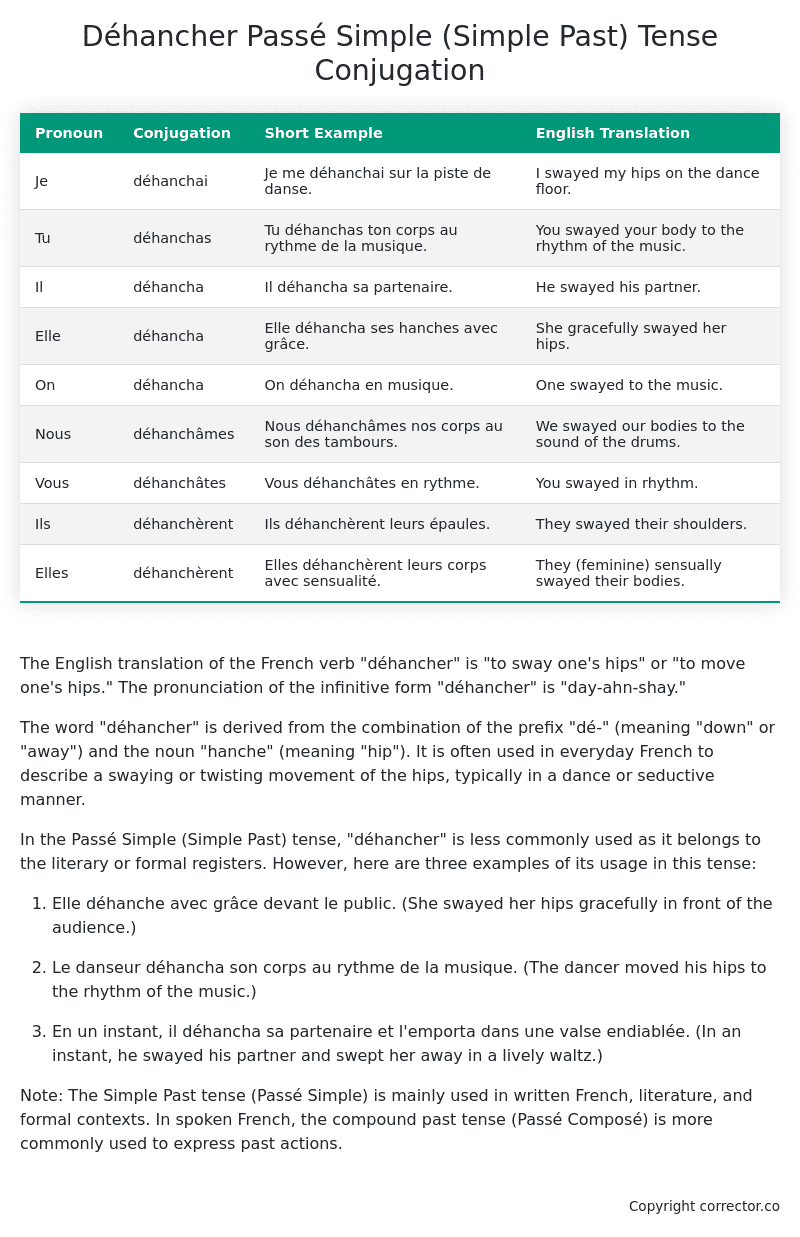Passé Simple (Simple Past) Tense Conjugation of the French Verb déhancher
Introduction to the verb déhancher
The English translation of the French verb “déhancher” is “to sway one’s hips” or “to move one’s hips.” The pronunciation of the infinitive form “déhancher” is “day-ahn-shay.”
The word “déhancher” is derived from the combination of the prefix “dé-” (meaning “down” or “away”) and the noun “hanche” (meaning “hip”). It is often used in everyday French to describe a swaying or twisting movement of the hips, typically in a dance or seductive manner.
In the Passé Simple (Simple Past) tense, “déhancher” is less commonly used as it belongs to the literary or formal registers. However, here are three examples of its usage in this tense:
-
Elle déhanche avec grâce devant le public.
(She swayed her hips gracefully in front of the audience.) -
Le danseur déhancha son corps au rythme de la musique.
(The dancer moved his hips to the rhythm of the music.) -
En un instant, il déhancha sa partenaire et l’emporta dans une valse endiablée.
(In an instant, he swayed his partner and swept her away in a lively waltz.)
Note: The Simple Past tense (Passé Simple) is mainly used in written French, literature, and formal contexts. In spoken French, the compound past tense (Passé Composé) is more commonly used to express past actions.
Table of the Passé Simple (Simple Past) Tense Conjugation of déhancher
| Pronoun | Conjugation | Short Example | English Translation |
|---|---|---|---|
| Je | déhanchai | Je me déhanchai sur la piste de danse. | I swayed my hips on the dance floor. |
| Tu | déhanchas | Tu déhanchas ton corps au rythme de la musique. | You swayed your body to the rhythm of the music. |
| Il | déhancha | Il déhancha sa partenaire. | He swayed his partner. |
| Elle | déhancha | Elle déhancha ses hanches avec grâce. | She gracefully swayed her hips. |
| On | déhancha | On déhancha en musique. | One swayed to the music. |
| Nous | déhanchâmes | Nous déhanchâmes nos corps au son des tambours. | We swayed our bodies to the sound of the drums. |
| Vous | déhanchâtes | Vous déhanchâtes en rythme. | You swayed in rhythm. |
| Ils | déhanchèrent | Ils déhanchèrent leurs épaules. | They swayed their shoulders. |
| Elles | déhanchèrent | Elles déhanchèrent leurs corps avec sensualité. | They (feminine) sensually swayed their bodies. |
Other Conjugations for Déhancher.
Le Present (Present Tense) Conjugation of the French Verb déhancher
Imparfait (Imperfect) Tense Conjugation of the French Verb déhancher
Passé Simple (Simple Past) Tense Conjugation of the French Verb déhancher (You’re reading it right now!)
Passé Composé (Present Perfect) Tense Conjugation of the French Verb déhancher
Futur Simple (Simple Future) Tense Conjugation of the French Verb déhancher
Futur Proche (Near Future) Tense Conjugation of the French Verb déhancher
Plus-que-parfait (Pluperfect) Tense Conjugation of the French Verb déhancher
Passé Antérieur (Past Anterior) Tense Conjugation of the French Verb déhancher
Futur Antérieur (Future Anterior) Tense Conjugation of the French Verb déhancher
Subjonctif Présent (Subjunctive Present) Tense Conjugation of the French Verb déhancher
Subjonctif Passé (Subjunctive Past) Tense Conjugation of the French Verb déhancher
Subjonctif Imparfait (Subjunctive Imperfect) Tense Conjugation of the French Verb déhancher
Subjonctif Plus-que-parfait (Subjunctive Pluperfect) Tense Conjugation of the French Verb déhancher
Conditionnel Présent (Conditional Present) Tense Conjugation of the French Verb déhancher
Conditionnel Passé (Conditional Past) Tense Conjugation of the French Verb déhancher
Conditionnel Passé II (Conditional Past II) Tense Conjugation of the French Verb déhancher
L’impératif Présent (Imperative Present) Tense Conjugation of the French Verb déhancher
L’impératif Passé (Imperative Past) Tense Conjugation of the French Verb déhancher
L’infinitif Présent (Infinitive Present) Tense Conjugation of the French Verb déhancher
L’infinitif Passé (Infinitive Past) Tense Conjugation of the French Verb déhancher
Le Participe Présent (Present Participle) Tense Conjugation of the French Verb déhancher
Le Participe Passé (Past Participle) Tense Conjugation of the French Verb déhancher
Struggling with French verbs or the language in general? Why not use our free French Grammar Checker – no registration required!
Get a FREE Download Study Sheet of this Conjugation 🔥
Simply right click the image below, click “save image” and get your free reference for the déhancher Passé Simple tense conjugation!

Déhancher – About the French Passé Simple (Simple Past) Tense
Formation
Usage
Narration
Historical Context
Interactions with other tenses
Passé Composé
Imparfait
Conditional and Subjunctive
Summary
I hope you enjoyed this article on the verb déhancher. Still in a learning mood? Check out another TOTALLY random French verb conjugation!


